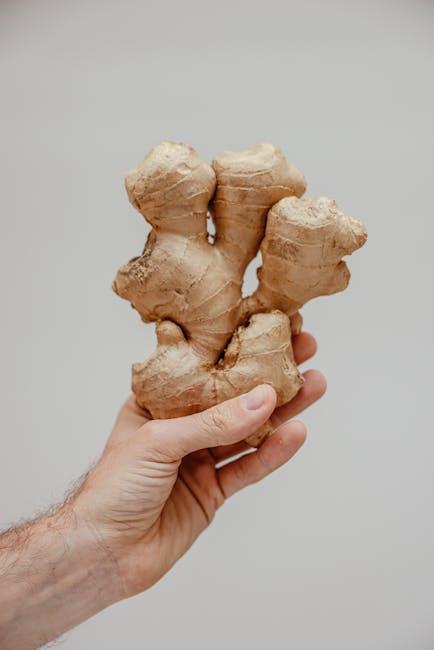Beneath the surface of our well-being lies a silent barrier, a delicate lining within the digestive system that plays a crucial role in keeping our health in balance. When this barrier becomes compromised—a condition often referred to as “leaky gut”—it can trigger a cascade of discomfort and systemic issues. Yet, healing this invisible fissure doesn’t always require pharmaceutical intervention or invasive treatments. In this article, we explore natural approaches to restoring gut integrity, offering insights into how diet, lifestyle, and mindful habits can gently mend the foundation of your digestive health and, in turn, support your overall vitality.
Table of Contents
- Understanding the Root Causes of Leaky Gut
- Essential Nutrients and Foods That Support Gut Repair
- Herbal Remedies and Natural Supplements for Intestinal Health
- Lifestyle Changes to Promote a Balanced Gut Environment
- Mind-Body Techniques to Enhance Digestive Healing
- Q&A
- Key Takeaways

Understanding the Root Causes of Leaky Gut
Leaky gut stems primarily from the disruption of the delicate balance of your intestinal lining. When this barrier becomes compromised, harmful substances like toxins, undigested food particles, and bacteria can pass through and trigger systemic inflammation. Several factors contribute to this breakdown, often working together in complex ways. Chronic stress, for example, has a powerful impact on gut permeability by altering the immune response and increasing inflammation. Likewise, frequent use of antibiotics and certain medications disturb the natural gut flora, allowing opportunistic pathogens to flourish and weaken the defensive wall.
Dietary choices play a crucial role as well. Foods high in processed sugars, gluten, and dairy have been linked to irritation and damage of the intestinal lining in susceptible individuals. Consider the following common contributors:
- Excessive alcohol consumption
- Imbalanced gut microbiome
- Food additives and preservatives
- Environmental toxins
- Chronic inflammation from autoimmune conditions
| Factor | Effect on Gut |
|---|---|
| Stress | Triggers inflammation, weakens barrier |
| Antibiotics | Disrupts healthy bacteria balance |
| Processed Foods | Irritates and damages lining |
| Environmental Toxins | Increases intestinal permeability |
Essential Nutrients and Foods That Support Gut Repair
Supporting gut repair begins with embracing a diet rich in essential nutrients known to soothe inflammation and rebuild the intestinal lining. Nutrients like glutamine, an amino acid, serve as fuel for the cells that line the gut, promoting regeneration and resilience. Equally important are omega-3 fatty acids, which help reduce gut inflammation and maintain a balanced microbiome. Incorporating vitamin D and zinc strengthens the gut barrier, while antioxidants such as vitamins A and C protect against oxidative stress linked to intestinal permeability.
Many wholesome foods naturally supply these vital nutrients. Consider adding the following to your daily meal plan for gut restoration:
- Bone broth: Rich in collagen and gelatin to reinforce the gut lining.
- Fermented foods: Like sauerkraut, kimchi, and kefir to boost beneficial bacteria.
- Leafy greens: Spinach and kale provide antioxidants and fiber to support digestion.
- Fatty fish: Salmon and mackerel supply anti-inflammatory omega-3s.
- Nuts and seeds: Almonds and chia seeds offer a source of zinc and magnesium.
Herbal Remedies and Natural Supplements for Intestinal Health
Harnessing the power of nature can be a gentle yet effective approach to restoring intestinal integrity. Herbal remedies such as slippery elm, aloe vera, and marshmallow root are celebrated for their soothing mucilage content, which helps calm inflamed gut linings and supports tissue repair. These herbs form a protective layer along the digestive tract, reducing irritation and promoting healing. Meanwhile, supplements rich in L-glutamine, zinc, and omega-3 fatty acids play a pivotal role in fortifying intestinal walls and reducing permeability, making them an integral part of any natural gut-healing regimen.
Integrating these agents thoughtfully can transform your approach to intestinal wellness. Consider incorporating:
- Slippery Elm – A natural demulcent that soothes and protects damaged tissue.
- Aloe Vera Juice – Known for its anti-inflammatory and gut-healing properties.
- L-Glutamine Powder – The preferred fuel for the cells lining the gut.
- Zinc Supplements – Essential for tissue repair and immune function.
- Omega-3 Fatty Acids – Help reduce inflammation and support membrane health.
| Natural Supplement | Key Benefit | Usage Tips |
|---|---|---|
| Slippery Elm | Soothes mucosal inflammation | Take as tea or capsules before meals |
| Aloe Vera | Reduces gut inflammation | Opt for pure juice, avoid laxative gels |
| L-Glutamine | Supports intestinal cell repair | Mix powder into smoothies or water daily |
| Zinc | Boosts immune response and healing | Prefer zinc picolinate for better absorption |
| Omega-3s | Decreases systemic and gut inflammation | Choose fish oil or algae-based supplements |
Lifestyle Changes to Promote a Balanced Gut Environment
Achieving a harmonious gut environment is essential for long-term digestive health and overall wellness. Start by prioritizing whole, unprocessed foods, which provide essential nutrients and fiber that fuel beneficial gut bacteria. Incorporating fermented foods like yogurt, kimchi, and sauerkraut can naturally enhance microbial diversity, assisting in healing and reinforcing the gut barrier. Additionally, managing stress through regular mindfulness practices such as yoga, meditation, or deep breathing exercises can significantly reduce gut inflammation and help maintain a resilient digestive lining.
Simple daily habits also make a remarkable difference in gut health. Consistency in sleep patterns ensures proper gut-cell regeneration, while staying adequately hydrated supports mucus production, shielding your gut lining. To optimize your lifestyle, consider implementing these vital steps:
- Limit exposure to unnecessary antibiotics and NSAIDs, as they can disrupt gut flora and increase intestinal permeability.
- Engage in moderate physical activity to stimulate gut motility and encourage a balanced microbiome.
- Avoid excessive alcohol and refined sugars that feed harmful bacteria and exacerbate gut imbalance.
| Lifestyle Element | Gut Benefit | Recommended Action |
|---|---|---|
| Fermented Foods | Boosts probiotic diversity | Daily servings of yogurt or kimchi |
| Stress Management | Reduces inflammation | 15 minutes meditation each day |
| Hydration | Supports mucus lining | Drink 8+ glasses of water |
| Exercise | Enhances gut motility | 30 minutes moderate activity |
Mind-Body Techniques to Enhance Digestive Healing
Enhancing digestive healing isn’t just about what you eat; your mind plays a critical role in restoring gut health. Stress and anxiety can exacerbate symptoms of leaky gut by disrupting the intricate communication between the brain and the digestive system. Incorporating mindfulness meditation and breathing exercises daily helps calm the nervous system, promoting better digestion and reducing inflammation. Even simple practices like grounding yourself in the present moment can encourage your body to shift into a restorative state, allowing the intestinal lining to repair more efficiently.
Another powerful approach is gentle movement, such as yoga or tai chi, which not only stimulates blood flow to the digestive organs but also balances the parasympathetic nervous system, enhancing gut motility and healing. Combining these techniques regularly creates a nurturing environment that supports the gut’s natural ability to regenerate. Below is a quick reference guide to some effective mind-body techniques you can start using today:
| Technique | Benefit for Digestive Healing | Suggested Frequency |
|---|---|---|
| Mindfulness Meditation | Reduces cortisol levels, calms gut inflammation | 10-15 minutes daily |
| Diaphragmatic Breathing | Enhances parasympathetic activation, improves digestion | 5 minutes, 2-3 times/day |
| Gentle Yoga | Improves blood flow, supports motility | 20 minutes, 3-4 times/week |
| Tai Chi | Balances nervous system, promotes relaxation | 15-30 minutes daily |
Q&A
Q&A: Healing Leaky Gut Naturally
Q1: What exactly is leaky gut?
A1: Leaky gut, or increased intestinal permeability, is a condition where the lining of the small intestine becomes damaged, allowing undigested food particles, toxins, and bacteria to “leak” into the bloodstream. This can trigger inflammation and may contribute to various health issues.
Q2: Can leaky gut be healed naturally?
A2: Yes, many people successfully improve or heal leaky gut through natural approaches. The key lies in addressing lifestyle, dietary choices, and supporting gut health with nourishing foods and habits.
Q3: What foods should I avoid to support healing?
A3: Common gut irritants include gluten, processed foods, excessive sugar, alcohol, and certain food additives. Eliminating or reducing these can calm inflammation and give your gut a chance to repair.
Q4: Which foods help nurture a healthy gut lining?
A4: Focus on whole, nutrient-dense foods like bone broth, fermented vegetables, leafy greens, healthy fats such as avocado and olive oil, and fiber-rich fruits and vegetables. These provide vital nutrients and feed beneficial gut bacteria.
Q5: How important is hydration in healing leaky gut?
A5: Staying well-hydrated is crucial. Water supports digestion, helps flush out toxins, and maintains the mucosal lining that protects your intestines.
Q6: Are supplements necessary for natural healing?
A6: Supplements can be helpful, especially probiotics to restore healthy gut flora, L-glutamine to support intestinal repair, and zinc to enhance mucosal integrity. However, it’s best to consult a healthcare professional before starting any.
Q7: Does stress affect leaky gut?
A7: Absolutely. Chronic stress can disrupt gut function and increase intestinal permeability. Incorporating stress-reducing practices such as meditation, gentle yoga, or deep breathing can aid in healing.
Q8: How long does it take to heal leaky gut naturally?
A8: Healing time varies widely depending on the individual and severity. It may take weeks to months of consistent dietary and lifestyle changes to see significant improvements.
Q9: Can exercise help?
A9: Moderate exercise can enhance circulation and support overall digestive health, but avoid overtraining, as excessive intensity may exacerbate gut inflammation.
Q10: When should I seek medical advice?
A10: If you experience persistent digestive issues, severe symptoms, or suspect an underlying condition, consult a healthcare provider. They can offer diagnosis, guidance, and tailor treatments to your needs.
By embracing mindful eating, wholesome nutrition, and balanced living, you can empower your body’s natural ability to heal and restore gut vitality—one mindful bite at a time.
Key Takeaways
In the intricate dance of health, healing a leaky gut naturally invites us to listen closely to our bodies, honor their signals, and nurture them with patience and care. While science continues to unravel the mysteries within, embracing wholesome foods, mindful habits, and gentle remedies can pave the way toward restored balance. Remember, the journey to gut health is not a race but a steady walk—guided by awareness, consistency, and a touch of nature’s wisdom. Here’s to cultivating wellness from the inside out, one mindful step at a time.

